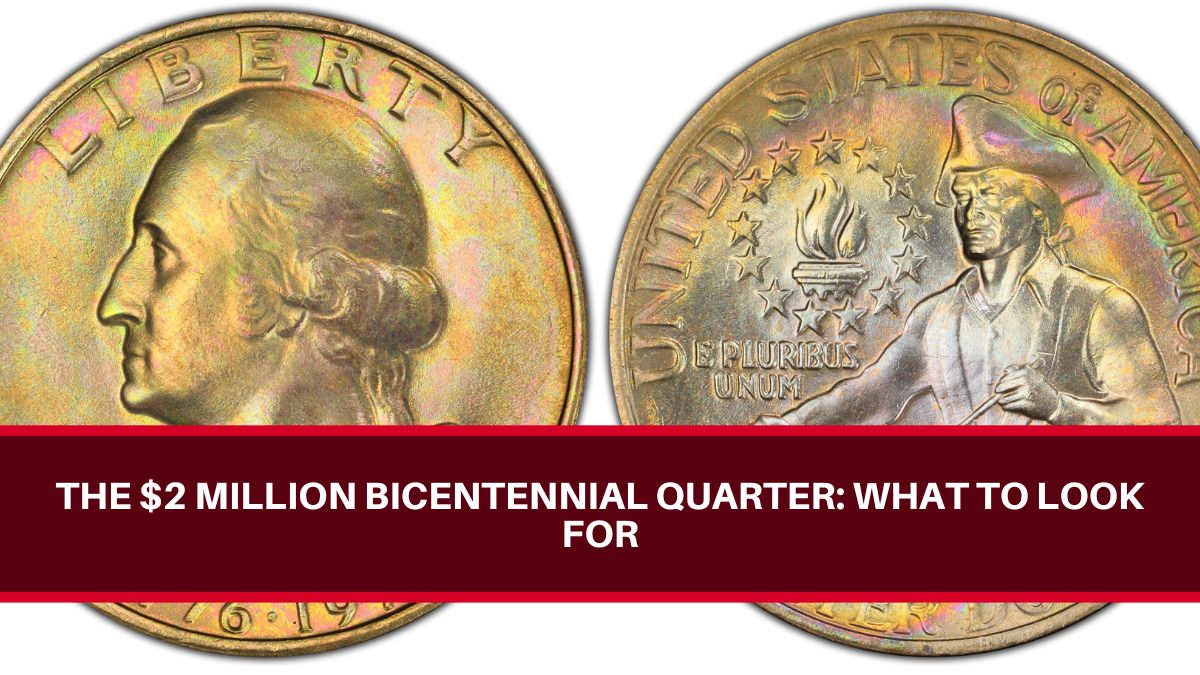The 1976 Bicentennial quarter is a coin that holds special significance in American history, commemorating 200 years of the United States’ independence. While many of these coins were produced, a rare version of the Bicentennial quarter has gained immense value because of a unique minting error. This article will guide you through why this specific quarter is worth $2 million and how to identify one if you come across it.
What is the 1976 Bicentennial Quarter?
The Bicentennial quarter was released in 1976 to celebrate the 200th anniversary of American independence. Unlike regular Washington quarters, this coin features a distinctive design on the reverse side, created by Jack L. Ahr, showing a Colonial drummer and 13 stars, symbolizing the original colonies. Additionally, the coin has a special dual date on the front: “1776-1976,” marking its commemorative purpose.
What Makes the $2 Million Bicentennial Quarter Special?
1. Minting Error
This specific Bicentennial quarter is valued at $2 million due to a rare minting error. It was mistakenly struck on a silver planchet, which is normally used for half dollars, instead of the usual copper-nickel planchet used for quarters. This error makes the coin extremely rare and highly sought after by collectors.
2. Perfect Condition
The condition of the coin plays a big role in its value. This quarter has been graded Mint State 68 (MS68) by the Professional Coin Grading Service (PCGS), which means it is in near-perfect condition with no visible signs of wear or damage.
3. Historical Importance
The 1976 Bicentennial quarter commemorates a critical moment in U.S. history—200 years of independence. The combination of this historical significance and the rarity of the minting error has made this coin one of the most valuable in the world.
Key Characteristics of the $2 Million Bicentennial Quarter
| Feature | Description |
|---|---|
| Year | 1976 (Dual date: 1776-1976) |
| Obverse Design | Portrait of George Washington with dual date |
| Reverse Design | Colonial drummer and 13 stars |
| Minting Error | Struck on a silver planchet intended for half dollars |
| Condition | Graded MS68 by PCGS |
| Estimated Value | $2 million |
How to Identify a $2 Million Bicentennial Quarter
Wondering if you have one of these valuable quarters? Here’s what you should look for:
- Weight: A silver planchet would make the quarter heavier (around 11.5 grams) compared to regular Bicentennial quarters, which weigh around 5.67 grams.
- Edge Examination: Regular quarters have a visible copper stripe along the edge. If your coin doesn’t show this stripe, it may be a silver planchet error.
- Condition: The coin must be in near-perfect condition with no major wear. It’s crucial to have it graded by PCGS or NGC to confirm its value.
The Market for Rare Coins
Rare coins, like the $2 million Bicentennial quarter, have been appreciating in value over time. Collectors and investors view them as blue-chip assets, often breaking records at auctions. Whether you are a seasoned collector or someone who stumbles upon a rare find, investing in rare coins can be lucrative.
Comparison with Other High-Value Coins
| Coin Name | Year | Key Feature | Estimated Value |
|---|---|---|---|
| 1976 Bicentennial Quarter | 1976 | Silver planchet error | $2 million |
| 1933 Double Eagle | 1933 | Rare gold coin | $18.9 million |
| 1794 Flowing Hair Dollar | 1794 | First U.S. dollar coin | $10 million |
| 1913 Liberty Head Nickel | 1913 | Extremely rare issue, only five known | $4.5 million |
| 1804 Silver Dollar | 1804 | Limited mintage, known as the “King of Coins” | $4 million |
Conclusion
The $2 million Bicentennial quarter is a prime example of how a combination of rarity, minting errors, perfect condition, and historical importance can make a coin incredibly valuable. If you think you may have found one, it’s crucial to have it authenticated and graded by a professional service like PCGS. Who knows? You might be sitting on a treasure!
FAQ’s
How can I tell if my Bicentennial quarter is rare?
Check its weight and edge for a copper stripe. If the coin is noticeably heavier and lacks the copper line, it might be a rare minting error coin.
What does MS68 mean?
MS68 is a grading score from the Professional Coin Grading Service (PCGS), indicating the coin is in near-perfect condition with no visible signs of wear.
Why is the silver planchet error so valuable?
Minting errors are extremely rare, and a quarter struck on a silver planchet is unusual. This rarity drives up its value among collectors.

